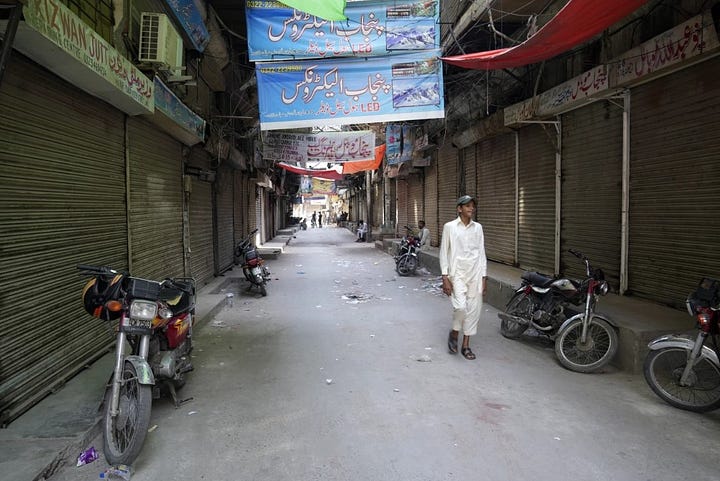
In a widespread demonstration of discontent, Pakistani traders embarked on a countrywide strike on Saturday to protest against the mounting cost of living. This includes soaring fuel and utility bills, along with a record depreciation of the rupee against the dollar, which has left the public deeply dissatisfied.
The strike saw businesses across the nation close their shutters, while protesters took to the streets, setting tires ablaze to voice their frustrations. The call for the strike came from former senator Sirajul Haq, the leader of the religious political party Jamaat-e-Islami. It garnered substantial support from trade and business organizations, market associations, lawyers’ groups, and transporters.
In Karachi, Pakistan’s commercial and economic hub, nearly all activities came to a standstill, with sparse vehicular traffic on the roads, and markets and shopping centers shuttered. A trader in Karachi, Fahad Ahmed, explained the motive behind the strike: “We have shut our shops in protest so that our message reaches the ruling class. If they don’t consider our problems, we will devise further strategies. If you pay 100,000 rupees ($330) in rent for your shop and have to pay an equal amount in electricity bills, how can you survive?”
In Lahore, the capital of Punjab province, major markets remained closed for the day, lawyers refrained from attending court sessions, and intercity and local public transport ceased operations. Meanwhile, the cities of Peshawar in the northwest and Quetta in the southwest experienced partial closures.
Pakistan’s annual inflation rate soared to 27.4% in August, according to data from the state-run Bureau of Statistics. The country had been on the brink of default before securing a lifeline deal with the International Monetary Fund (IMF). As part of the conditions for the IMF bailout package, Pakistan was mandated to reduce subsidies aimed at mitigating the impact of rising living costs, likely contributing to the price hikes, particularly in energy costs.
Economist Mohammad Sohail, head of Topline Securities, noted that despite the IMF program, Pakistan faces formidable challenges. The government is striving to implement painful IMF-mandated reforms amid growing political polarization. Sohail emphasized the key role of currency depreciation in driving inflation and suggested that strict stabilization measures coupled with improved foreign exchange reserves could stabilize the currency and mitigate future inflation.
The substantial depreciation of the Pakistani rupee against the dollar, surpassing the historic threshold of 300 rupees to the dollar, has led to increased import costs, further fueling inflation.
Jamal Uddin, a shopkeeper in Dera Ghazi Khan, explained that he and fellow traders had joined the protest because it had become nearly impossible for them to support their families.
Shamim Bibi, a widow and mother of three in Multan, revealed the grim reality of her family’s life, where her daughters had to quit school and her young son resorted to running a food stall to meet daily needs. She cited inflated electricity bills, high fuel and food prices, and escalating rent as major contributors to their misery.
However, caretaker Prime Minister Anwaarul Haq Kakar downplayed the significance of the protests, referring to the grievances as a “non-issue.” Contributing to this report were Mohammad Farooq in Karachi, Babar Dogar in Lahore, Asim Tanveer in Multan, Riaz Khan in Peshawar, and Abdul Sattar in Quetta.